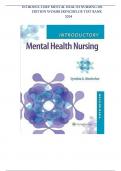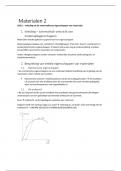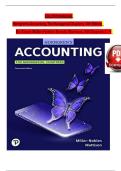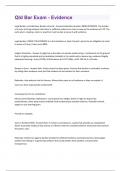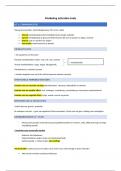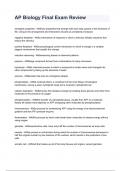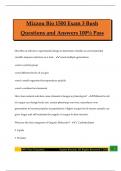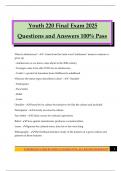First Additional Language Teaching
in the Foundation Phase
FLT3701
October/ November Exam 2022
Vanessa Carles
Student number: 64948722
Date: 8 November 2022
,HONESTY DECLARATION
I, VANESSA CARLES
Student number: 64948722
Module code: FLT3701
Hereby declare the following:
I understand UNISA’s policy on plagiarism. This examination is my original work produced by
myself. I have duly acknowledged all the other people’s work (both electronic and print)
through the proper reference techniques as stipulated in this module.
I have not copied work of other and handed it in as my own. I have also not made my work
available to any fellow students to submit as their own.
Signature: Date: 8 November 2022
, Question 1
1.1 We teach a second language to provide children with important language skills that will
enable them to communicate meaningfully as well as to read and write at primary level.
Language is an interactive communicative process and are divided into four main
categories: listening, speaking, reading, and writing. Although the four language skills
are interrelated and often overlap, children generally acquire their second language
skills in the following order:
1) Listening
• Listening is the first skill learners acquire in the Foundation Phase as they are not
able to speak the second language yet.
• There needs to be differentiation between listening as a natural ability and as a
learned skill.
• Listening is a skill that needs to be taught as an effective communication skill which
will allow learners to hear for meaning as well as to speak in an effective manner.
• To facilitate understanding and interpretation, it is crucial to teach learners how to
listen for information.
2) Speaking
• Each learner will experience learning an additional language in a different way.
• Simple language must be used when communicating with the learners.
• Breathing and articulation should be the focus when they are taught how to
speak.
• In order to make sense of phonics, learners must be taught to recognise that a
word is made up of a sequence of distinct sounds.
• Just like listening, speaking is also a very acquired skill that needs to be
practised continuously in order for it to improve. The more learners listen to
spoken language, the more they will develop their speaking skills and the better
they will communicate.
• Speaking begins by using simple basic words that are usually associated with
pictures and from there it slowly develops into phrases and sentences.
• Simple strategies like role-play and simple conversations or dialogue must be
used to develop speaking and language skills.
3) Reading/viewing
• Basically, reading means to decode and identify print.
• The text and teaching strategy that the teacher will use, will be determined by the
specific purpose of the reading.
• In-dept approaches and methodologies are used in the home language, but in
the FAL reading is introduced in a much simpler form.
in the Foundation Phase
FLT3701
October/ November Exam 2022
Vanessa Carles
Student number: 64948722
Date: 8 November 2022
,HONESTY DECLARATION
I, VANESSA CARLES
Student number: 64948722
Module code: FLT3701
Hereby declare the following:
I understand UNISA’s policy on plagiarism. This examination is my original work produced by
myself. I have duly acknowledged all the other people’s work (both electronic and print)
through the proper reference techniques as stipulated in this module.
I have not copied work of other and handed it in as my own. I have also not made my work
available to any fellow students to submit as their own.
Signature: Date: 8 November 2022
, Question 1
1.1 We teach a second language to provide children with important language skills that will
enable them to communicate meaningfully as well as to read and write at primary level.
Language is an interactive communicative process and are divided into four main
categories: listening, speaking, reading, and writing. Although the four language skills
are interrelated and often overlap, children generally acquire their second language
skills in the following order:
1) Listening
• Listening is the first skill learners acquire in the Foundation Phase as they are not
able to speak the second language yet.
• There needs to be differentiation between listening as a natural ability and as a
learned skill.
• Listening is a skill that needs to be taught as an effective communication skill which
will allow learners to hear for meaning as well as to speak in an effective manner.
• To facilitate understanding and interpretation, it is crucial to teach learners how to
listen for information.
2) Speaking
• Each learner will experience learning an additional language in a different way.
• Simple language must be used when communicating with the learners.
• Breathing and articulation should be the focus when they are taught how to
speak.
• In order to make sense of phonics, learners must be taught to recognise that a
word is made up of a sequence of distinct sounds.
• Just like listening, speaking is also a very acquired skill that needs to be
practised continuously in order for it to improve. The more learners listen to
spoken language, the more they will develop their speaking skills and the better
they will communicate.
• Speaking begins by using simple basic words that are usually associated with
pictures and from there it slowly develops into phrases and sentences.
• Simple strategies like role-play and simple conversations or dialogue must be
used to develop speaking and language skills.
3) Reading/viewing
• Basically, reading means to decode and identify print.
• The text and teaching strategy that the teacher will use, will be determined by the
specific purpose of the reading.
• In-dept approaches and methodologies are used in the home language, but in
the FAL reading is introduced in a much simpler form.


